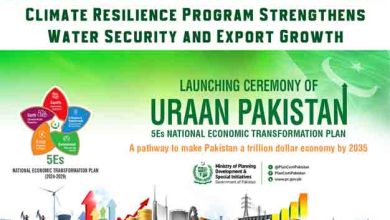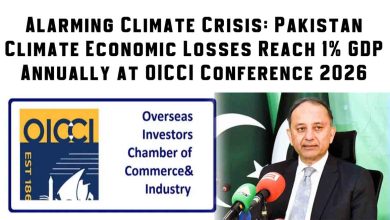Urgent Climate Threat 2026: Pakistan AI Climate Disaster Prediction Drive Aims to Save Lives and Billions
Pakistan AI climate disaster prediction initiatives are gaining momentum as the climate minister urges AI adoption to forecast floods, monitor risks, and strengthen disaster preparedness nationwide.
Pakistan AI climate disaster prediction has emerged as a national priority as the country’s leadership pushes for advanced technology to combat escalating climate threats.
Speaking in Islamabad, Climate Change Minister Dr Musadik Malik urged policymakers and institutions to harness artificial intelligence (AI) to strengthen disaster preparedness and enhance real-time monitoring of climate vulnerabilities.
With climate-induced floods, heatwaves, and extreme weather becoming increasingly frequent, Malik stressed that predictive technologies could significantly reduce human and economic losses.
Related coverage: Pakistan’s climate resilience
Pakistan Among World’s Most Climate-Vulnerable Nations
Pakistan consistently ranks among the most climate-vulnerable countries globally, despite contributing less than one percent to global greenhouse gas emissions.
Over recent years, the nation has experienced:
Erratic monsoon patterns
Intensifying heatwaves
Unprecedented snowfall in northern regions
Repeated flooding disasters
According to climate experts, warming temperatures are disrupting long-established weather systems, increasing the likelihood of catastrophic events.
For global climate vulnerability rankings, see:
https://www.germanwatch.org/en/cri
Deadly Floods Highlight Need for Predictive Technology
Recent climate disasters underscore the urgency of adopting Pakistan AI climate disaster prediction systems.
In 2022, monsoon floods:
- Killed over 1,700 people
- Displaced 33 million citizens
- Caused more than $30 billion in losses
Last year alone, another 1,037 people lost their lives to massive flooding, while extreme snowfall and rains stranded hundreds across northern districts.
These recurring tragedies reveal the limitations of traditional disaster forecasting systems and the critical need for smarter early-warning solutions.
AI’s Role in Climate Governance and Risk Management
Addressing the National Artificial Intelligence Workshop, Minister Malik highlighted AI’s potential to transform climate governance and public policy.
“The most impactful application of AI lies in its predictive and preventive capabilities,” he said.
AI technologies can:
Analyze massive climate datasets
Integrate satellite and weather monitoring systems
Identify emerging risk patterns
Trigger early disaster alerts
Such systems allow authorities to intervene before disasters reach devastating levels.
Learn more about AI in climate risk forecasting:
https://www.weforum.org/agenda/ai-climate-change
Overcoming Data Gaps Through Smart Modelling
One of Pakistan’s biggest challenges remains fragmented and limited climate data.
According to Malik, AI-based modelling can overcome these gaps by:
- Combining multiple data sources
- Detecting trends invisible to manual analysis
- Designing targeted, high-impact interventions
“With limited resources, AI allows us to achieve maximum impact,” he emphasized.
This approach could dramatically improve water management, flood control planning, and emergency response efficiency.
Indus AI Week and Pakistan’s $1 Billion Digital Vision
The minister’s remarks came shortly after the launch of Indus AI Week, a national initiative aimed at:
Aligning AI policy frameworks
Promoting industry adoption
Developing AI talent
Encouraging innovation
Prime Minister Shehbaz Sharif also announced that Pakistan plans to invest $1 billion in AI by 2030 to modernize the digital economy.
This investment signals a strategic shift toward technology-driven development across governance sectors.
For AI development trends in emerging economies:
https://www.worldbank.org/en/topic/digitaldevelopment
Early Warning Systems Powered by Artificial Intelligence
One of the most promising applications of Pakistan AI climate disaster prediction is the creation of advanced early warning systems.
By integrating:
Satellite imagery
Weather sensors
Geographic information systems
Real-time monitoring platforms
AI can provide authorities with predictive insights days or even weeks in advance.
This allows:
Timely evacuations
Infrastructure protection
Resource mobilization
Reduced fatalities
Countries using AI-based forecasting have already seen significant disaster loss reductions.
AI, Employment Risks, and Workforce Reskilling
While embracing AI innovation, Malik also warned about its potential impact on employment.
He highlighted the emergence of AI agents capable of replacing certain job functions.
“Governments must ensure timely reskilling and workforce transition,” he stressed.
Key priorities include:
Digital skills training
Job transition programs
Continuous learning initiatives
Without proactive planning, technological progress could widen social inequalities.
Why Innovation Matters for Long-Term Climate Resilience
Malik emphasized that technology adoption alone is not enough.
“One-time productivity gains come from technology, but lasting progress comes from innovation,” he noted.
Long-term climate resilience requires:
Continuous research and development
Local innovation ecosystems
Public–private collaboration
Policy-driven technological integration
Only through sustained innovation can Pakistan adapt to an increasingly volatile climate future.
The Future of Climate Protection in Pakistan
As climate risks accelerate, Pakistan AI climate disaster prediction represents a critical evolution in disaster management strategy.
By leveraging predictive analytics, real-time monitoring, and smart modelling, Pakistan has the opportunity to:
Save thousands of lives annually
Protect economic infrastructure
Improve resource efficiency
Strengthen national resilience
However, success will depend on:
- Institutional coordination
- Data infrastructure development
- Skilled workforce availability
- Long-term funding commitments
Final Reflection
Pakistan’s climate crisis is intensifying — but so are its technological ambitions.
By integrating artificial intelligence into climate governance, the country is taking a bold step toward proactive disaster prevention rather than reactive crisis response.
If implemented effectively, AI could become Pakistan’s most powerful tool in protecting communities, safeguarding the economy, and building a climate-resilient future.







